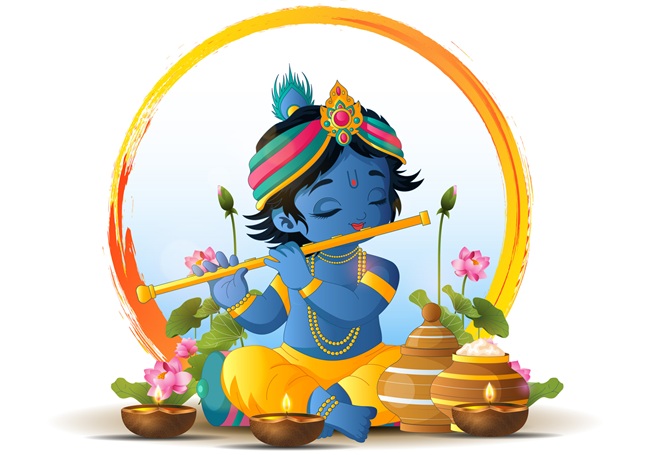Mar 05, 2026
Mar 05, 2026
To find a poem and to read and enjoy exactly on the eve of Krishna Janmashtami is really a blessing, an endowment from the Unseen and we are lucky enough to have got it from Kasiprasad Ghosh who is but a festival chronicler and a narrator and he narrates the festivals and fairs and festive occasions which hold a sway over us. We generally read such a thing in the book of essays and paragraphs, but he has tried his hands poetically to bestow upon the verses of such a sort.

It was 1829 when Kasiprasad Ghosh wrote the poem Janmashtami. Can we imagine? How would be India then? Can you say?
Into the chronicles and annals of Indo-Anglican verse, we are lucky enough to find a poet of the then times in the name of Kasiprasad Ghosh who is but a promoter of cultural studies the way he takes up Indian festivities marking the days of the calendar.
The flaming east tells of the rose illumined to be born, the day to be arising out, all the signs and signals proclaim of the coming of the Lord of Day. Planetary bodies like angels seem to be busy with an inter-examination, a crisscrossing as for the miracle to take place. The news in waiting seems to be broken at the right moment. Nature too is in consonant with to relate to the divine story.
What disturbs it the calm with commotion? It is the birth of the child, the divine child and the people throng to see, whispers take the centre space as the world keeps talking about the arrival of, the birth of the child. Krishna is coming. The wishes and prayers of penitent saints finally get it rewarded as for their selfless penance seeking benediction for all. Drums, cymbals, pipes and conches take the night, break the spell announcing the birth of the divine child.
The woodland tribes salute the rising sun, they rave, sing and dance. The cuckoos too join the band with their sweetest notes. The flowing river, the fragrant grove, the flowers and the bulbuls, all seem to be a-flutter with, a new spirit seems to be taking them along. The waters and the musical murmur, the winds and the streams tell of a commotion to empower and overtake it.
Janmashtami
Or Janma Yatra, a festival in commemoration of the birth of Krishna.
I.
Lo! where the flaming east of brightening morn,
Proclaims the coming of the Lord of Day,
The various streaks that all the skies adorn,
Like angels shooting through the heavenly way,
To every clime the joyous news convey,
And nature fair who wept in dew-drops, wears,
Decked with a verdant smile, an aspect gay,
As beauty’s visage being washed with tears.
More lovely, fair and beautifully bright appears.
II.
The woodland tribes salute the rising sun,
Or rove delightful or attune their song,
To fling his notes the Koil hath begun,
And others join him in the grove along
The sacred river, while the flowers among,
His lay so merrily the Bulbul sings,
As if the moments which to heaven belong,
Were given to him alone. The soft gale flings
The sighs of flowers and bears their odors on its wings.
III.
But hark ! what noise invades the peaceful ear ?
What shouts and joyful acclamations rise ?
Why sounds of cymbals, drums, and pipes appear,-
As if to rend the vault of yonder skies ?
Why should the people with astonished eyes
Crowd to the place where Nanda doth reside ?
Why many a learned, holy sage there hides
Whose wealth is prayer and virtue is whose guide ?
’Tis Krishna born to crush the demons and their pride.
IV.
Behold the power supreme revealed on earth.
In mortal dress ! His infant head .is crowned
With beams of glory, and his promised birth
With gladness fills the whole creation round.
The demons proud whose impious souls are bound,
With ignorance’s and delusion’s chain,
Shrink at the holy conch-shell’s herald sound,
As if afflicted with a mortal pain,
And see with hopeless eyes their all endeavors vain.
V.
Look, look how beautiful ! The new-born boy
Reclines upon its mother’s cautious-arm,
Like young Hope resting in the breast of Joy,
Around whom wantons every infant charm,
Which makes with future hope all bosoms warm
Of thronging men and many a saintly sage.
Who gaze delighted on young Krishna’s form.
For now the long oppressive, baneful age
Will be no more ere long, and fiends will cease to rage.
VI.
Now soon the wicked king of demons foul,
Will feel the dread result of all his hate ;
And soon beneath the god’s divine control,
Bow justly to his predetermined fate :
His power and impious glory, which so late
Have spread sad terrors o’er the trembling land,
Even like a meteor from its blazing state,
Will fall to nothing by th’ almighty hand
Of Vishnu great and Bhagavati’s high command.
December 19, 1829
Janmashtami is the talk of the poem. The divine child to be born is the whisper of the night. All seem to be a part of the whispers doing the rounds, the miracle to take us by surprise.
Look, look at the newly-born babe. How much does it find itself settled into the bosom of its mother?
This is but Divine Lila. An age to be born is also the thing. All the things, coming events cast their shadows before the coming of the Lord, the birth of Krishna. Krishna is coming to end the tyranny of Kansa. The news spreads like a wild fire.
Image (c) istock.com
16-Aug-2025
More by : Bijay Kant Dubey